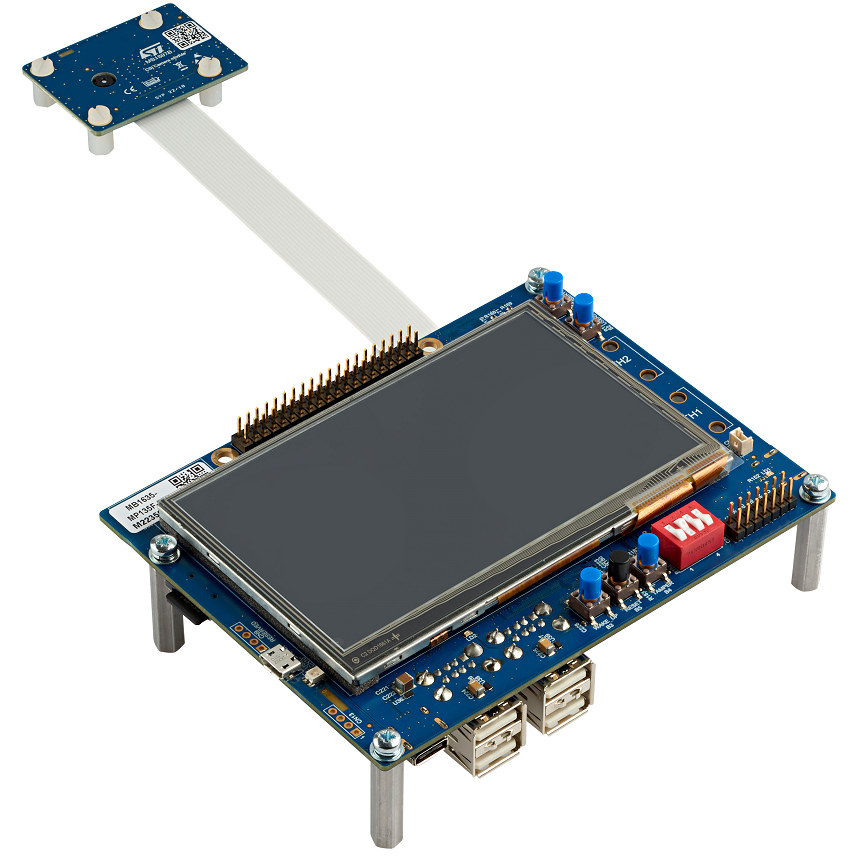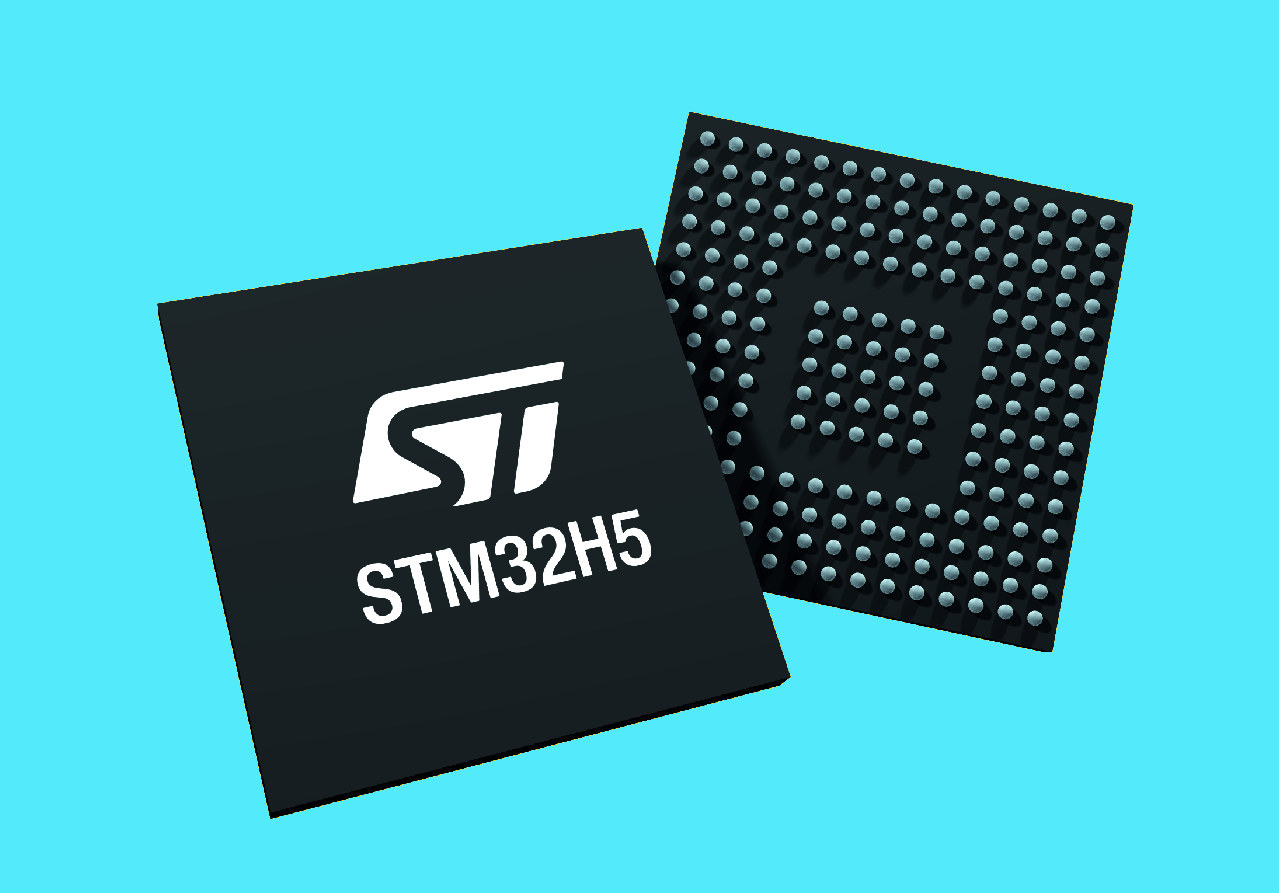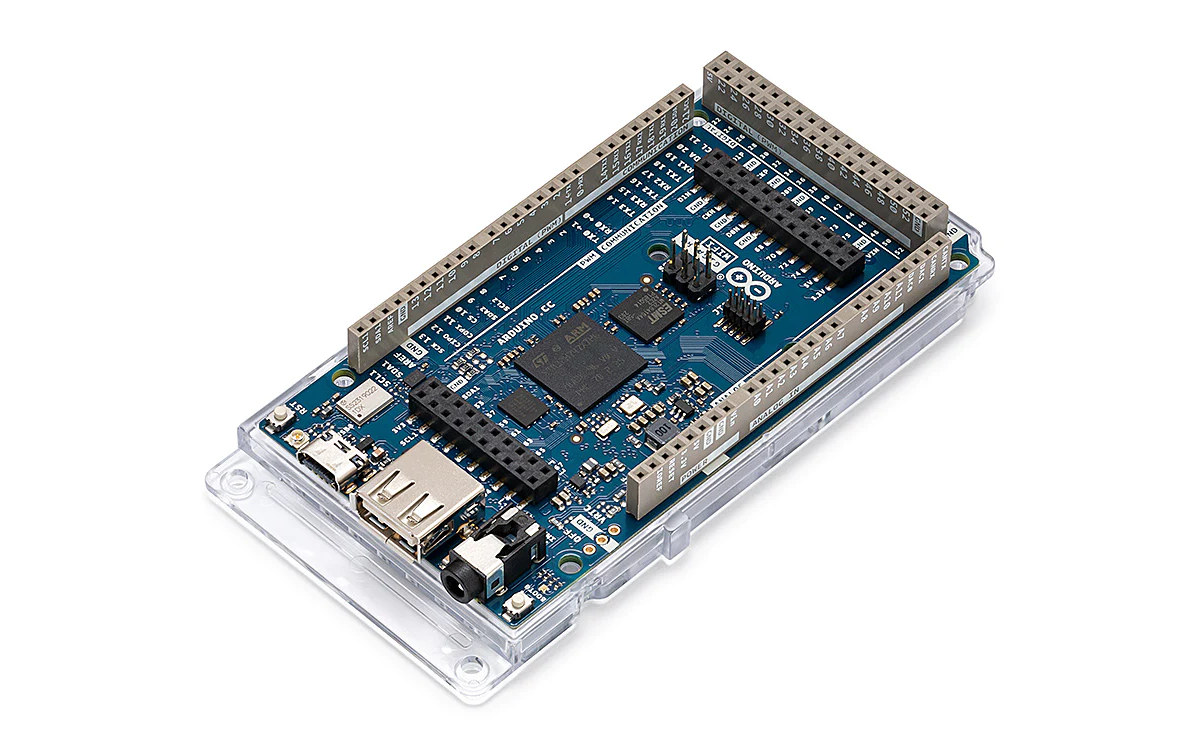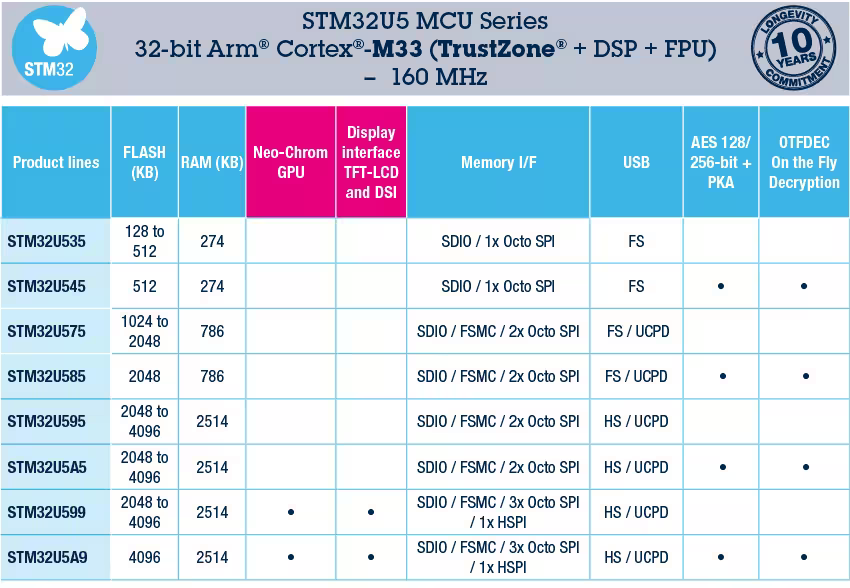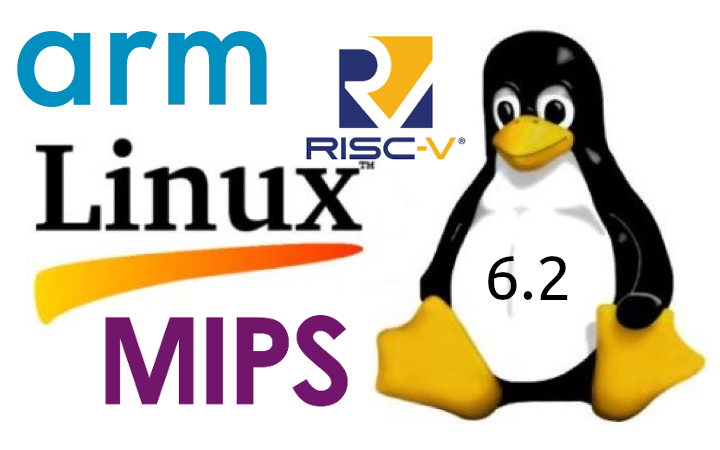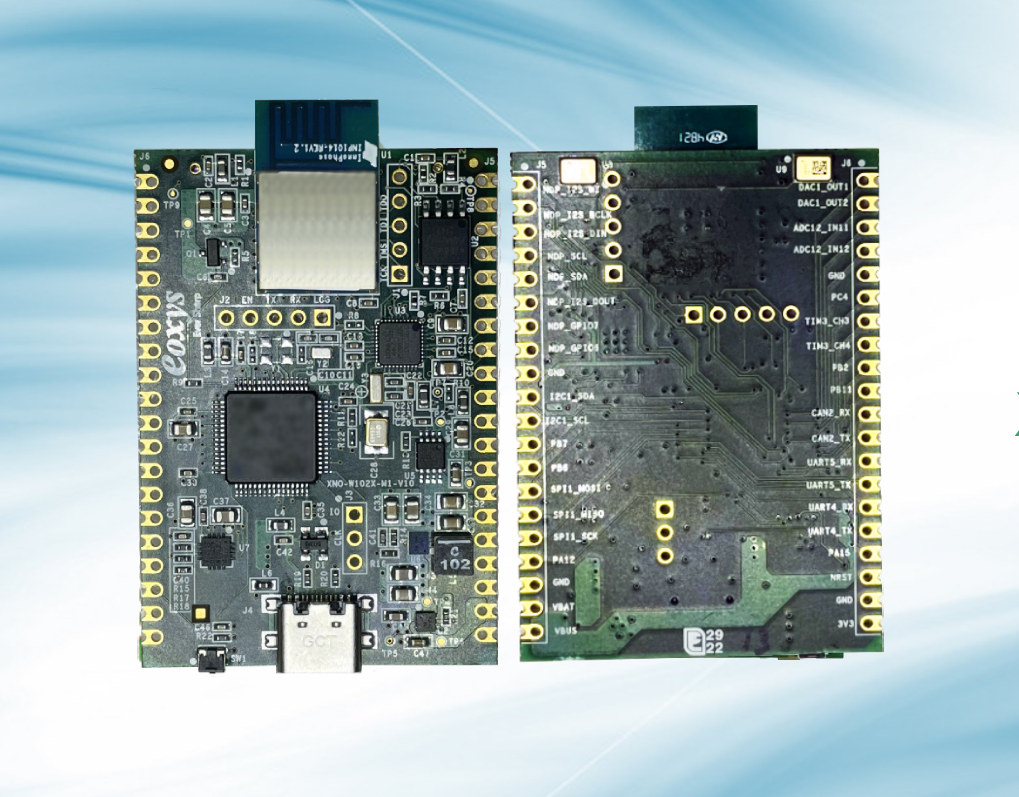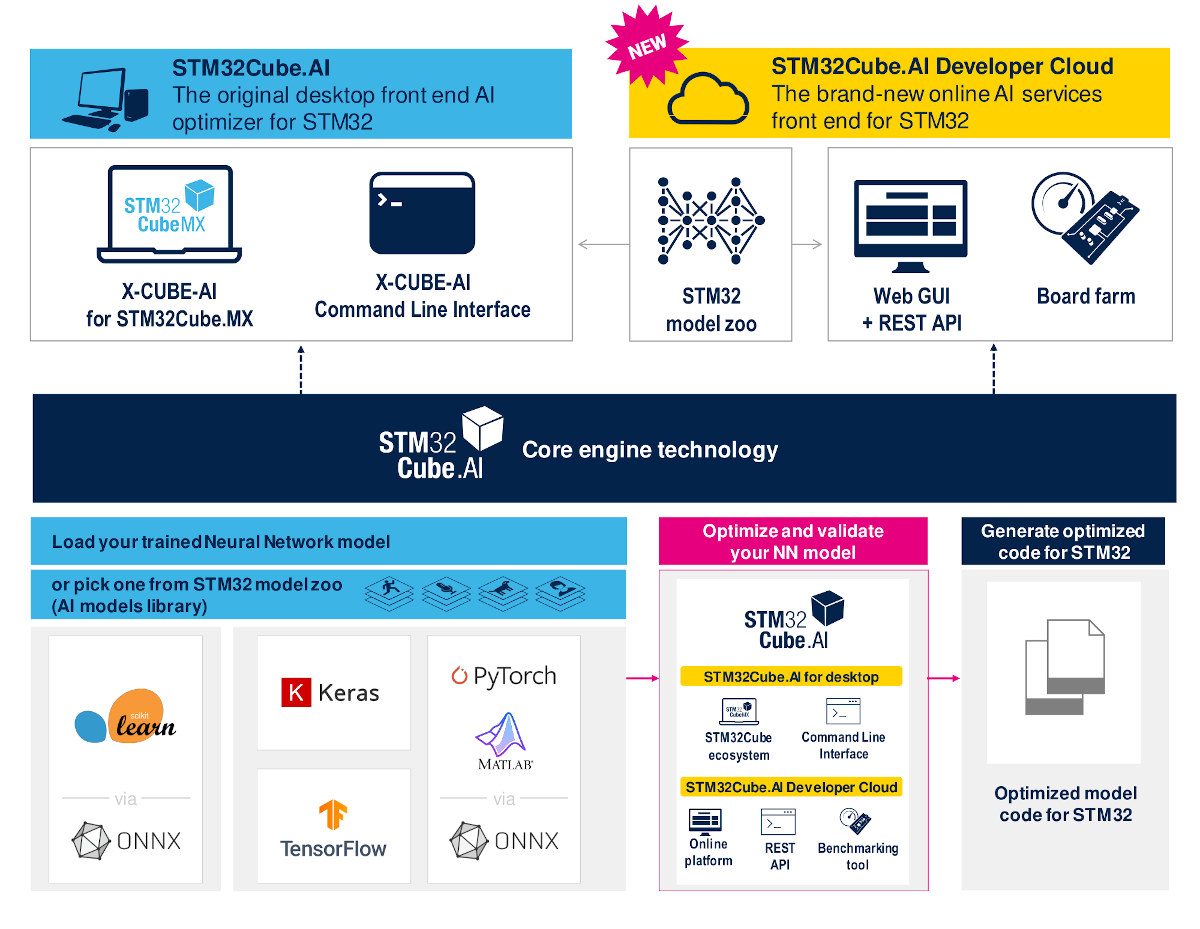Digi International ConnectCore MP13 system-on-module (SoM) is powered by the just-announced STMicro STM32MP13 Cortex-A7 microprocessor and integrates a pre-certified WiFi 5 and Bluetooth 5.2 module for applications in the medical, smart energy, and industrial sectors. The module is also equipped with up to 1GB RAM and 1GB SLC NAND flash, and exposes I/Os through LGA pads and/or castellated holes with interfaces such as dual GbE, USB 2.0, I2S and SPDIF for audio, CAN FD, analog inputs, and more. Contrary to the company’s earlier Digi ConnectCore MP15 based on STM32MP15 MPU, the MP13 does not provide multimedia functions, display, and camera interfaces. Digi ConnectCore MP13 specifications: SoC – STMicro STM32MP13x single-core Arm Cortex-A7 processor @ 650 MHz (only STM32MP133C at this time) System Memory – Up to 1GB DDR3 Storage – Up to 1GB SLC NAND flash Wireless – Optional pre-certified Wi-Fi 5 802.11a/b/g/n/ac up to 433.3 Mbps and Bluetooth 5.2 […]
STMicro introduces cost-optimized STM32MP13 Cortex-A7 microprocessor
STMicroelectronics’ STM32MP13 1 GHz single-core Arm Cortex-A7 microprocessor series is the latest addition to the Linux-capable STM32MP1 family, with a cost-optimized design that does without the Cortex-M4 real-time core found in the original STM32MP15 series, while still offering Ethernet, CAN FD, camera and display depending on the specific SKU: STM32MP131, STTM32MP133, or STM32MP135. STM32MP131 The STM32MP131 is a single-core Cortex-A7 core clocked at 650 MHz or 1GHz with Ethernet connectivity and is the most cost-effective part of the new STM32MP13 series. Four parts are available in three different packet sizes (TGBGA 289, TFBGA 320, and LFBGA 289) as well as some parts with “advanced security features” that include a cryptographic accelerator, memory protections, code isolation mechanisms for runtime protection, functions to ensure platform authentication, and a complete security ecosystem. The STM32MP131 can run entry-level Linux, bare metal or RTOS systems with Microsoft Azure RTOS pre-integrated. STM32MP133 The STM32MP133 single-core Cortex-A7 […]
STMicro STM32H5 Arm Cortex-M33 MCU clocks at 250 MHz, supports STM32Trust TEE Secure Manager
STMicroelectronics has announced the STM32H5 Arm Cortex-M33 “high-performance” microcontroller family clocked at up to 250 MHz and supporting STM32Trust TEE Secure Manager to boost both performance and security in “next-generation smart applications”. The STM32H5 family has three product types namely the higher-end STM32H563/573 with up to 2MB flash, 640KB SRAM, Ethernet, and hardware security, the STM32H562 with a similar design but fewer interfaces, and the entry-level STM32H502 with 128KB flash, 32KB SRAM. STM32H5 key features and specifications: MCU core – Arm Cortex-M33 core with TrustZone technology, digital signal processing (DSP) and floating-point unit (FPU) running up to 250 MHz; Up to 375 DMIPS and a 1023 CoreMark score executing from the flash memory Memory and Storage STM32H563/573/562 – 1 to 2 Mbytes of flash memory, 640 Kbytes of SRAM STM32H503 – 128 Kbytes of flash memory and 32 Kbytes of RAM. OSPI serial flash memory interface Up to 2x SDMMC […]
Arduino GIGA R1 WiFi board launches with STM32H7 MCU, up to 76 I/O pins
Arduino GIGA R1 WiFi board brings the STM32H7 dual-core Cortex-M7/M4 microcontroller found in the Portenta H7 boards to the larger Arduino Mega/Due form factor with up to 76 GPIO pins. As its name implies, the board also comes with a WiFi 4 (and Bluetooth 5.1) module, as well as an audio jack, a USB Type-C port for programming, a USB 2.0 Type-A host port, and extra connectors for a display and a camera. Arduino GIGA R1 WiFi board specifications: Microcontroller – STMicro STM32H747XI Cortex-M7 @ 480 MHz + M4 @ 200 MHz MCU with 2MB dual-bank Flash memory, 1 MB RAM, Chrom-ART graphical hardware accelerator System Memory – 8MB SDRAM Storage – 16MB QSPI NOR flash Connectivity – 2.4GHz WiFi 802.11b/g/n up to 65 Mbps and Bluetooth 5.1 BR/EDR/LE via Murata 1DX module Display – 20-pin header (J5) Camera – 20-pin Arducam camera header (J6) USB 1x USB Type-C port […]
STMicro adds more STM32U5 Cortex-M33 MCUs with NeoChrom 2.5D GPU, 128KB to 4MB flash, NIST certification, etc…
STMicro has added three new families to its STM32U5 Cortex-M33 microcontroller series with the entry-level STM32U535/545 with as little as 128KB flash, the STM32U595/5A5 with up to 4MB of Flash and 2,514KB of RAM, and the STM32U599/5A9 with similar features as the STM32U595/5A5 by adding the new NeoChrom 2.5D GPU plus TFT-LCD and DSI display interfaces. STMicro also announced that STM32U5 series MCUs were the first general-purpose MCUs to receive NIST-embedded random-number entropy source certification. As of now, along with the STM32U575/585 introduced in February 2021 with an optional Chrom-ART 2D GPU, STMicro offers eight product lines as part of the STM32U5 MCU series as shown in the table below. That means the STM32U5 microcontroller can address a wider range of applications with the STM32U535/545 targetting lower-cost applications with less flash and RAM, the “legacy” STM32U575/U585 for mid-range applications, and the STM32U59X/5AX for applications where more storage and memory is […]
Linux 6.2 release – Main changes, Arm, RISC-V, and MIPS architectures
Linux 6.2 has just been released with Linus Torvalds making the announcement on LKML as usual: So here we are, right on (the extended) schedule, with 6.2 out. Nothing unexpected happened last week, with just a random selection of small fixes spread all over, with nothing really standing out. The shortlog is tiny and appended below, you can scroll through it if you’re bored. Wed have a couple of small things that Thorsten was tracking on the regression side, but I wasn’t going to apply any last-minute patches that weren’t actively pushed by maintainers, so they will have to show up for stable. Nothing seemed even remotely worth trying to delay things for. And this obviously means that the 6.3 merge window will open tomorrow, and I already have 30+ pull requests queued up, which I really appreciate. I like how people have started to take the whole “ready for […]
Eoxys Xeno+ Nano ML board combines NuMicro M2354 or STM32L4 MCU with Talaria TWO ultra low power WiFi & BLE 5.0 module
Eoxys Xeno+ Nano ML is a wireless machine learning (ML) board with either Nuvoton NuMicro M2354 or STMicro STM32L4 microcontroller, InnoPhase IoT’s Talaria TWO ultra-low power Wi-Fi and BLE 5.0 module, and the Syntiant Core 2 NDP120 neural decision processor we first noticed in the Arduino Nicla Voice module a few weeks ago. The boards/modules are designed for intelligent and secure IoT devices for smart home, industrial, and medical automation applications, and the company claims it can be used in Wi-Fi IoT sensors with up to 10+ years thanks to the low-power chips and circuitry used in the design. Eoxys Xeno+ Nano ML specifications: General purpose MCU (one or the other) STMicro STM32L4 Arm Cortex-M4 microcontroller at 80MHz with 1MB flash, 128KB/352KB SRAM Nuvoton NuMicro M2354 Arm Cortex-M23 microcontroller at 96MHz with 1MB flash, 128KB SRAM. Wireless module Innophase Talaria TWO ultra-low-power 2.4GHz 802.11b/n/g WiFi 4 and Bluetooth LE 5.0 […]
STM32Cube.AI Developer Cloud generates AI workloads for STM32 microcontrollers
STMicroelectronics has just announced the STM32Cube.AI Developer Cloud opening access to a suite of online AI development tools for the STM32 microcontrollers (MCUs) allowing developers to generate, optimize, and benchmark AI working on the company’s 32-bit Arm microcontrollers. The company sus the STM32Cube.AI Developer Cloud is based on the existing STM32Cube.AI ecosystem of desktop tools with the added benefit of being able to remotely benchmark models on STM32 hardware through the cloud in order to save on workload and cost. Some of the highlights of the online tools include: An online interface to generate optimized C-code for STM32 microcontrollers without requiring prior software installation. Access to the STM32 model zoo, a repository of trainable deep-learning models and demos. It currently features human motion sensing for activity recognition and tracking, computer vision for image classification or object detection, audio event detection for audio classification, and more. You’ll find those on GitHub […]


